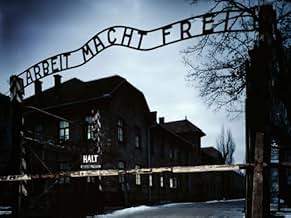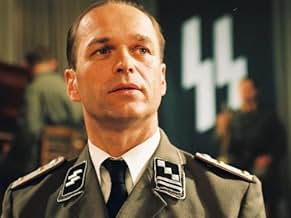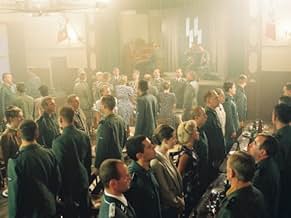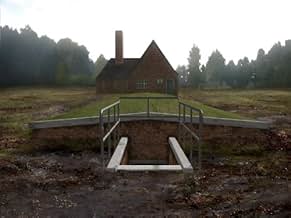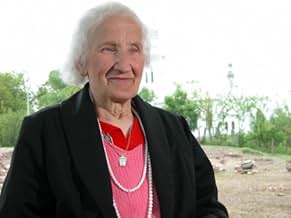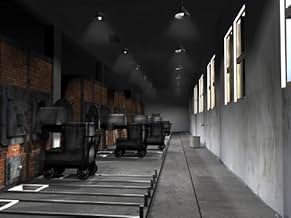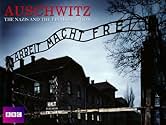IMDb-BEWERTUNG
8,6/10
4749
IHRE BEWERTUNG
Füge eine Handlung in deiner Sprache hinzuThe history of the Final Solution phase of the Nazi Holocaust, particularly with the most infamous of the death camps.The history of the Final Solution phase of the Nazi Holocaust, particularly with the most infamous of the death camps.The history of the Final Solution phase of the Nazi Holocaust, particularly with the most infamous of the death camps.
Folgen durchsuchen
Empfohlene Bewertungen
Sat through this entire 3-4 hours BBC documentary with 3D graphics to fully understand " the holocaust " horror . This masterpiece of fact compilation that is absolutely neutral , goes into every angle of subject visualization and authenticity has changed me forever . A must see for everyone to understand how thin are the lines that we draw , how delicate is the balance of peace and most importantly how the most intelligent , cultured humans can metamorphose to utter cruel worthless beasts , so that never ever something like this can happen here again !!!Amazing narratives , real photographs and visualization .Children should see this , do not prevent them from seeing the truth by raising some rating standards !!!
People involved with the production of this documentary understand and achieve the maturity in which not many people attain. It is that the facts of the Holocaust need no over-dramatisation at all. A simplistic and even storytelling, plus fairness and calmness, is just right, if one wants real impact for the audience. This piece of excellent journalism establishes the evolutionary nature of a thinking mind: it grows on you. Watching this documentary is comparable to hearing a politely confident voice taking us down the road we do not plan to complete the journey. Just like death camps themselves, or the mind of the Jewish and other victims at the time, people in the field did not know what they were up against. Unfortunate circumstances, at first, had led to bad, worse, and finally hopeless situation for those violated and abused at the extreme. Some people lost their sense of optimism and logical thinking. Some people firmly believed that "God" had completely forgotten this Hell on earth, or simply found it too much of a Hell to visit. I think that the producers and directors of this documentary had wanted to walk us step by step, without attempting to let us presume anything. Personal judgment at the end, therefore, is genuine. I believe it is by way of honouring this dark saga of human tragedy most properly. it is too large an issue to be pre-cooked. It must be knowledgeably and decently presented to the audience, and let that audience figure out themselves. This documentary feature has accomplished that task. People who watch would have the memories with them for life. I grew up all my life in Asia. Far away from Hell of Auschwitz and other death camps a million miles apart. Yet, I feel the feeling. I feel the historical task to do whatever I can about it. Yes, I share.
I'm not a Jew so I have no axe to grind.
This is probably the most comprehensive account of the most infamous death-camp of them all. Not only are ex-inmates interviewed, but also ex-SS guards who are extraordinarily candid about their work & their attitude to the prisoners. The whole machinery involved in the organisation & efficiency of what amounted to an entire murder camp system.
This 6 part documentary cannot be ignored, once you have seen the evidence & heard the testimony there will be no doubt in your mind. It did happen & it was done by people not much different from the rest of us.
It cannot be allowed to happen again.
This is probably the most comprehensive account of the most infamous death-camp of them all. Not only are ex-inmates interviewed, but also ex-SS guards who are extraordinarily candid about their work & their attitude to the prisoners. The whole machinery involved in the organisation & efficiency of what amounted to an entire murder camp system.
This 6 part documentary cannot be ignored, once you have seen the evidence & heard the testimony there will be no doubt in your mind. It did happen & it was done by people not much different from the rest of us.
It cannot be allowed to happen again.
TV often fails to convey complex information: both in facts and emotionally; instead it mostly serves up the obvious with images to trick our eyes.
This documentary sets a new standard: the research is impeccable, the interviews gripping, the production perfect in every respect and finally the horror, the terrible horror of what humans can do, is absolutely clear. A history book could not do a better job.
One of the best and bravest aspects of the series is when the interviewers ask a person how they felt about a murder they committed: did they regret it, how do they feel about it now? Those interactions make it worth watching the series alone.
This documentary sets a new standard: the research is impeccable, the interviews gripping, the production perfect in every respect and finally the horror, the terrible horror of what humans can do, is absolutely clear. A history book could not do a better job.
One of the best and bravest aspects of the series is when the interviewers ask a person how they felt about a murder they committed: did they regret it, how do they feel about it now? Those interactions make it worth watching the series alone.
This is the story of the Nazi concentration camp of Auschwitz. We follow it from the very beginning in 1940 until its liberation by Russian troops in January 1945. We also get a glimpse of the aftermath in the form of the Nuremberg trials and we follow the destiny of central figures in the extermination of Jews, Gypsys, Russian POWs and political prisoners from mainly Poland. One of the most unpleasant aspects of this story is that some of the survivors of the camps has lead a miserable life after the war as they were not welcomed by various reasons when they returned home.
The series contains 6 episodes of about 45 minutes each. It is build up by interviews of former prisoners as well as a couple of guards. There is also extensive footage in the form of photography, film-clips and various documents.
In an attempt to make the story come more alive the producers have also hired German actors to play out the role of central figures in Auschwitz; Rudolf Höss, Adolf Eichman, Heinrich Himmler and Dr. Joseph Mengele to name a few. With the help of computer techniques the buildings of Auschwitz has been rebuild in order to get a view of how the camp looked like with specific attention to the gas-chambers and the barracks were the prisoners lived.
So a lot of work has been put into telling the story of one of the darkest chapters in human history. It is truly a depressing tale that leaves you with the big (and unanswered) question: how could this happen? And how can we avoid this happening again? For some reason BBC has chosen not to interview other than eye witnesses and therefore I personally was missing the explanation that a historian, sociologist etc could give to the phenomenon of Holocaust. As a psychologist myself I wondered about this; how can the combination of hatred and discipline be stronger than empathy with the prisoners? Empathy is not something that we choose but something that is always there. So how could those that were involved with the slaughtering of the prisoners not empathize with them? Maybe they did empathize with them after all - but empathy does not always lead to sympathy. It can also lead to sadism I think. Either way, the ability to empathize would dictate that the Germans were not unaffected by their actions which we also are told. Höss never liked the killings and especially in the beginning when it was done by shooting it made him uneasy.
One of the more controversial stories that are being told is that the allied forces refused to bomb the railroad-tracks leading to Auschwitz although they knew what was going on and although they were bombing IG Farben only 6 kilometers away. We have an eyewitness from Auschwitz telling us, that she saw the airplanes from the allied forces flying by and from an air photo of the camp we see that it is easy to identify the crematorium. Why didn't the allied forces drop a few bombs? This is really beyond me and makes me wonder if the allied had some sort of hidden agenda.
Another more controversial story is the story of the Hungarian Jews. The Germans apparently tried to bargain with their lives and wanted trucks in exchange of Jews. In a document from the allied forces we learn that it was seen as "blackmail" and that the allied forces saw a big problem in getting around 700.000 (I think) Jews to house and to feed. So the consequence was that they went straight to Auschwitz and the gas chambers.
Especially one interview with a guard by the name of Oskar Gröning is remembered; he is without remorse but decided to participate when he learned that theHolocaust by some people are being denied. The lack of remorse is interesting. It is tempting to understand the absence of this as a result of defense mechanisms at work.
I will not give this top rating as there was too much description and too little explanation. I also think that it was unnecessary to employ actors. A good narrative could have done the work instead. On the other hand you have the invaluable interviews with the eyewitnesses who will be dead and gone in a few years.
Regards Simon
The series contains 6 episodes of about 45 minutes each. It is build up by interviews of former prisoners as well as a couple of guards. There is also extensive footage in the form of photography, film-clips and various documents.
In an attempt to make the story come more alive the producers have also hired German actors to play out the role of central figures in Auschwitz; Rudolf Höss, Adolf Eichman, Heinrich Himmler and Dr. Joseph Mengele to name a few. With the help of computer techniques the buildings of Auschwitz has been rebuild in order to get a view of how the camp looked like with specific attention to the gas-chambers and the barracks were the prisoners lived.
So a lot of work has been put into telling the story of one of the darkest chapters in human history. It is truly a depressing tale that leaves you with the big (and unanswered) question: how could this happen? And how can we avoid this happening again? For some reason BBC has chosen not to interview other than eye witnesses and therefore I personally was missing the explanation that a historian, sociologist etc could give to the phenomenon of Holocaust. As a psychologist myself I wondered about this; how can the combination of hatred and discipline be stronger than empathy with the prisoners? Empathy is not something that we choose but something that is always there. So how could those that were involved with the slaughtering of the prisoners not empathize with them? Maybe they did empathize with them after all - but empathy does not always lead to sympathy. It can also lead to sadism I think. Either way, the ability to empathize would dictate that the Germans were not unaffected by their actions which we also are told. Höss never liked the killings and especially in the beginning when it was done by shooting it made him uneasy.
One of the more controversial stories that are being told is that the allied forces refused to bomb the railroad-tracks leading to Auschwitz although they knew what was going on and although they were bombing IG Farben only 6 kilometers away. We have an eyewitness from Auschwitz telling us, that she saw the airplanes from the allied forces flying by and from an air photo of the camp we see that it is easy to identify the crematorium. Why didn't the allied forces drop a few bombs? This is really beyond me and makes me wonder if the allied had some sort of hidden agenda.
Another more controversial story is the story of the Hungarian Jews. The Germans apparently tried to bargain with their lives and wanted trucks in exchange of Jews. In a document from the allied forces we learn that it was seen as "blackmail" and that the allied forces saw a big problem in getting around 700.000 (I think) Jews to house and to feed. So the consequence was that they went straight to Auschwitz and the gas chambers.
Especially one interview with a guard by the name of Oskar Gröning is remembered; he is without remorse but decided to participate when he learned that theHolocaust by some people are being denied. The lack of remorse is interesting. It is tempting to understand the absence of this as a result of defense mechanisms at work.
I will not give this top rating as there was too much description and too little explanation. I also think that it was unnecessary to employ actors. A good narrative could have done the work instead. On the other hand you have the invaluable interviews with the eyewitnesses who will be dead and gone in a few years.
Regards Simon
Wusstest du schon
- WissenswertesAlle Einträge enthalten Spoiler
- Alternative VersionenIn Spain, on January 29, 2005, a 104-minute cut was premiered on television. Hosted by the actress María Galiana, and with additional interviews to the Spanish survivors Jaume Álvarez, Enric Marcó and Neus Català. And co-produced by Sagrega TV, SA.
- VerbindungenFeatured in Ein Tag in Auschwitz (2020)
Top-Auswahl
Melde dich zum Bewerten an und greife auf die Watchlist für personalisierte Empfehlungen zu.
- How many seasons does Auschwitz: Inside the Nazi State have?Powered by Alexa
Details
- Erscheinungsdatum
- Herkunftsländer
- Offizieller Standort
- Sprache
- Auch bekannt als
- Auschwitz: Inside the Nazi State
- Drehorte
- Produktionsfirmen
- Weitere beteiligte Unternehmen bei IMDbPro anzeigen
- Laufzeit48 Minuten
- Farbe
- Sound-Mix
- Seitenverhältnis
- 1.78 : 1
Zu dieser Seite beitragen
Bearbeitung vorschlagen oder fehlenden Inhalt hinzufügen


